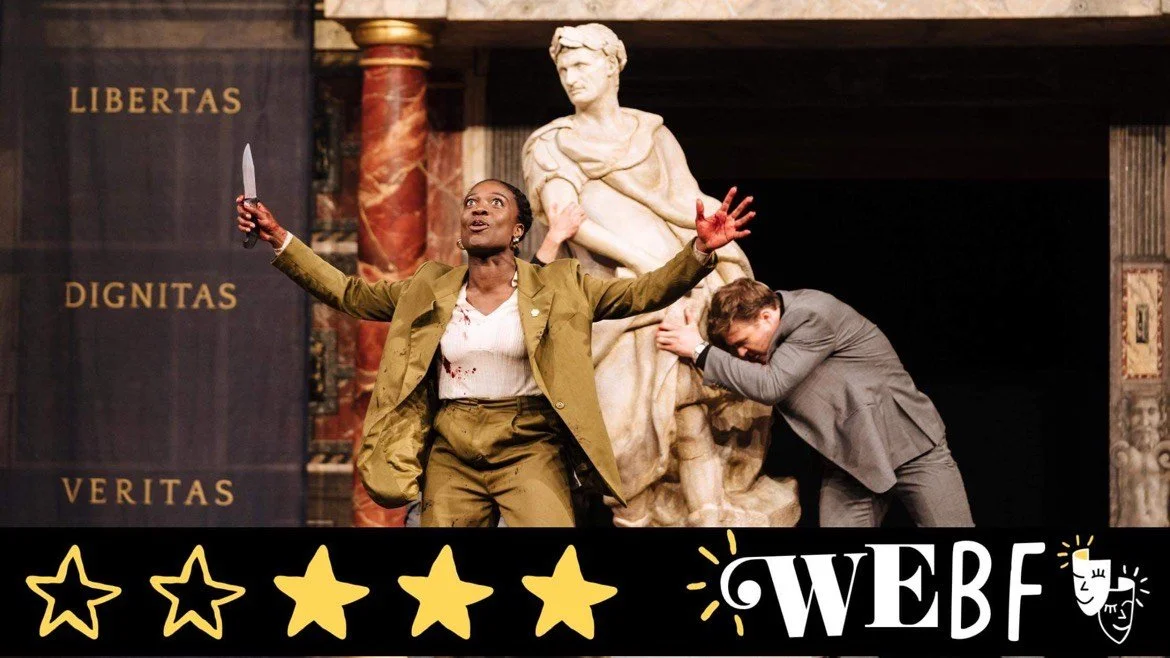Review: JULIUS CAESAR, Shakespeare’s Globe
Photo credit: Helen Murray
One of the most theatrically impactful experiences for an audience must be a show at Shakespeare’s Globe. Few spaces have the power to take you back in time, but the Globe always will. It can take you to any time, any place, with minimal props and costume. Julius Caesar is a fantastic example of the Globe’s dexterity as a performance space and recognition must go to the show’s Designer, Khadija Raza.
The play starts punchily, with Omar Bynon bringing exuberance and energy to the stage. He gets the audience onside from the beginning with a panto-style call and response which feels more like the USA elections in 2016 than Roman Civilization. It seemed like the whole play would be set against a modern backdrop in this way and it is a shame that this call and response with the Soothsayer never returns.
A stronger sense of time and place would have helped the weight of the storytelling throughout as we had no real context and therefore the stakes feel low at times. This sense of timelessness does make an important point about how political landscapes, and issues of gender, race, and class within them, will (and should) always face scrutiny. However, a stronger sense of social identity may have made for higher stakes and greater investment from the audience. It would especially help to drive the plot in Act 2 as the pace seems to drop a little.
Although the play is titled Julius Caesar, Brutus speaks more than four times as many lines as Caesar and Anna Crichlow is truly captivating for each one. The relationship between Brutus and Cassius (Charlotte Bate) is relatable and engaging. As a pair, they give truthful performances, playing off one another’s energy amusingly in Act 1 and tragically in Act 2. The death of Cassius feels like the most heart-breaking point of the play as Bate succeeds in capturing Cassius’s inner turmoil. One of the most poignant moments is her understanding that she would be dying on her birthday. The journeys that Cassius and Brutus undertake are the key to the play’s storytelling and both actors carry the plot with impressive skill. Moreover, they give weight to the confrontation of society’s outdated views of women in power.
Recognition must be given to the Fight Directors, Rachel Bown-Williams and Ruth Cooper-Brown. The fights in Act 2 are captivating and well-staged, adding mountains of tension. Caesar’s death in Act 1 feels a little clumsy in its execution and staging but remains impactful thanks to the power and energy of the company. Caught giggling at the fake blood, the audience is suddenly silenced by Dickon Tyrrell’s brilliant moment of death. The guttural cry of “no” as he died really captures a central part of the story, and of the psychological battles that unfold. Samuel Oatley delivers a strong performance as Mark Antony and is beautifully relatable as he mourns Caesar’s death.
The entire company fit together like a jigsaw and must be commended for their teamwork and ensemble skills. Impressive physicality and accent work make the multi-roling believable and entertaining. Amie Francis, Jack Myers, Omar Bynon and Cash Holland deserve mention for their quick changes and ability to morph between characters seamlessly. Moreover, the cast deal wonderfully with an audience perhaps slightly too reminiscent of a rowdier Shakespearian crowd at times!
Julius Caesar is a strong example of Shakespeare’s timelessness and our fortune at having this wonderful theatre in the heart of London. Although a stronger sense of time and place could have heightened the impact of the storytelling, the company all give fantastic performances and it is certainly one to catch at the Globe or out on tour.
*** Three stars
Reviewed by: Eliza Harris
Julius Caesar plays at the Globe until 10 September, with tickets available here.

